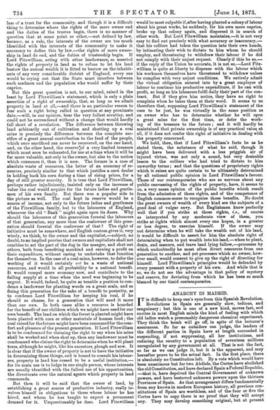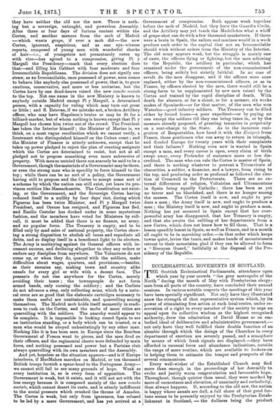ANARCHY IN MADRID.
IT is difficult to keep one's eyes from this Spanish Revolution. Revolutions in Spain are generally slow, tedious, and sanguinary ; but this is one of a new kind, moves fast, and excites in most English minds the kind of feeling with which old ladies watch a presumably dangerous chemical experiment. They think the bomb will go off, in spite of the lecturer's assurances. So far as outsiders can judge, the leaders of the different parties in Spain have at length succeeded in suspending, if not suppressing, all her institutions, and reducing the country to a population of seventeen millions unregulated by -any government at all. That is not the fact, so far as we can judge it, but it is the apparent, and may hereafter prove to be the actual fact. In the first place, there is absolutely no Constitution left. By a vote which would have been unanimous but for two Abdiels, the Cortes have abolished the old Constitution, and have declared Spain aFecleralRepublic, —that is, have deprived the Central Government of unknown powers, and have bestowed unknown powers upon the thirteen Provinces of Spain. As that arrangement differs fundamentally from any known in modern European history, all previous con- stitutions of Spain are worthless, and of the four or five the Cortes have to copy there is no proof that they will accept any. They may develop something original, but at present they have neither the old nor the new. There is noth- ing but a sovereign, untaught, and powerless Assembly. After three or four days of furious contest within the Cortes, and another menace from the mob of Madrid —which wants grape, if ever a mob did—the new Cortes, ignorant, suspicious, and as one eye-witness reports, composed of young men with wonderful shocks of hair—i.e. of youngsters not prematurely eaten up with vice—has agreed to a compromise, giving Pi y Marge11 the Presidency—mark that every election does that—and filling his Cabinet with four -moderate and four Irreconcilable Republicans. The division does not signify one straw, as an Irreconcilable, once possessed of power, soon comes to behave like anybody else possessed of power, that is, to grow cautious, conservative, and more or less unitarian, but the Cortes have by one dead-heave raised the new couche sociale to the top. Not one name in the new Ministry is known to anybody outside Madrid except Pi y Marge11, a determined person, with a capacity for ruling which may turn out great or little ; and S. Estevan, if we mistake not, a broken Artillery officer, who may have Napoleon's brains or may be fit for a billiard-marker, but of whom nothing is known except that Pi y Marge11 has chosen him twice out of the crowd. The President has taken the Interior himself ; the Minister of Marine is, we think, on a most vague recollection which we cannot verify, a lieutenant who distinguished himself on the Cuban coast ; and the Minister of Finance is utterly unknown, except that he takes up power pledged to reject the plan of creating assignats which the Cortes are determined to resist, but not at all pledged not to propose something even more subversive of property. With men so untried there can scarcely be said to be a Government, though the materials of a Government may be there, or even the strong man who is speedily to force himself to the top ; while there can be no sort of a policy, the Government having still to propose and the Cortes to accept some sort of a scheme by which the nation can still exist, yet leave its pro- vinces entities like Massachusetts. The Constitution not exist- ing, or the Government, and the Sovereign Cortes having reduced itself to a nullity by four days' riot, during which Figueras has been twice Minister, and Pi y Margall twice President, and Orense has resigned, and Figueras has fled, and Emilio Castelar has ducked under in some mysterious fashion, and the members have voted for Ministers by roll- call, it must be added that there is no finance, no army, and no popular force. The Treasury is empty, and to be filled only by mad sales of national property, the Cortes show- ing a strong disposition, to abolish all taxes and repudiate all debts, and so display itself in a beneficent light to its electors. The Army is mutinying against its General officers with in- cessant success, and declining altogether to obey any orders or endure any discipline from anywhere. The Volunteers do not come up, or when they do, quarrel with the soldiers, make difficulties about wages, quarters, and provisions,—besides, as their enemies say, making town and country alike unsafe for every girl or wife with a decent face. The peasants do not rise anywhere for the Cortes, merely avoiding their taxes ; the townspeople do not form armed bands, only cursing the soldiery ; and the Carlists do not advance a step, only collecting arms, which by a natu- ral error are so good that the elaborate cartridges necessary to make them useful are unattainable, and quarrelling among themselves. The Madrid mob holds itself momently in readi- ness to rush on the Cortes, and the mobs of most cities are quarrelling with the soldiers. The anarchy would appear to be complete. It is impossible in looking round Spain to see an institution standing, or a body which can be trusted, or a man who would be obeyed unhesitatingly by any other man. Nothing like it is has been seen in Europe since the Bourbon Government of France went to pieces, and the men fired on their officers, and the regimental chests were defended by main force, and nothing possessed real power but a Parisian club always quarrelling with its own members and the Assembly.
And yet, hopeless as the situation appears—and is if Europe interferes, if MacMahon marches on Madrid, or ten thousand British troops furnish a spear-head to the Portuguese Army— we cannot still fail to see many grounds of hope. Weak as every institution is, so is every form of opposition. The Government is weak, but it exists, and it will not act with the less energy because it is composed mainly of the new couche sociale, whiCh cannot desert its caste, and is utterly indifferent to the social pressure which crushed the throne of Amadeo. The Cortes is weak, but only from ignorance, has refused to be led by a mere Government, and has yet arrived at a Government of compromise. Both appear weak together before the mob of Madrid, but they have the Guardia Civile, and the Artillery may yet teach the Madrilefios what a whiff of grape-shot can do with a few thousand musketeers. If there were a brain in Spain, the sailors and marines would in a week produce such order in the capital that not an Irreconcilable should wink without orders from the Ministry of the Interior. The old army appears weak, but the struggle is mainly one of caste, the officers flying or fighting, but the men adhering to the Republic, the artillery in particular, which has remained under the government of the non-commissioned officers, being sulkily but strictly faithful. In no case of revolt do the men disappear, and if the officers were once replaced, either by the non-commissioned officers, or as in France, by officers elected by the men, there would still be a strong force to be supplemented by new men raised by the Cortes and trained by the rapid discipline of death. With death for absence, or for a shout, or for a menace, six weeks makes of Spaniards—or for that matter, of the men who won Waterloo—good infantry soldiers. The Treasury can be filled either by forced loans—a poor expedient—or by paying no one except the soldiers till they can bring taxes in, or by the measure already proposed, of granting tenancies in perpetuity on a rent-charge to the State. As to the immense emi- gration of Respectables, how fared it with the Emigre's from France, those gentlemen who ran away to return in triumph, and flooded Europe for twenty years with their complaints and their failures ? Nothing even now is wanted in Spain except a man, and every career is open, every claim of birth swept away, every Pretender of eminence more or less dis- credited. The man who can rule the Cortes is master of Spain, and there is nothing whatever to prevent a Triumvirate of obscurities, a soldier, a financier, and a lawyer, from rising to the top, and producing order as profound as followed the elec- tion of Cromwell to the Protectorate. There are no ex- ternal differences of religion, Voltairian and Ultramontane in Spain being equally Catholic ; there has been as yet no terror and no bloodshed, and there is no hunger among the masses. The Cortes itself is new, and ought to pro- duce a man ; the Army itself is new, and ought to produce a man ; the Ministry itself is new, and ought to produce a man. Nothing has yet occurred in Spain except that her over- powerful army has disappeared, that her Treasury is empty, and that she awaits the refilling of her departments from a new Cortes, which does not know how to fill them. That is a lesson speedily learnt in Spain, as well as France, and in a month all ought to be in marching order,—in that order which keeps towns quiet, levies the taxes, and makes bands of mountaineers retreat to their mountains, glad if they can be allowed to form a " Biscayan Guard," faithfully at the disposal of the Pre- sidency of the Republic.



































 Previous page
Previous page